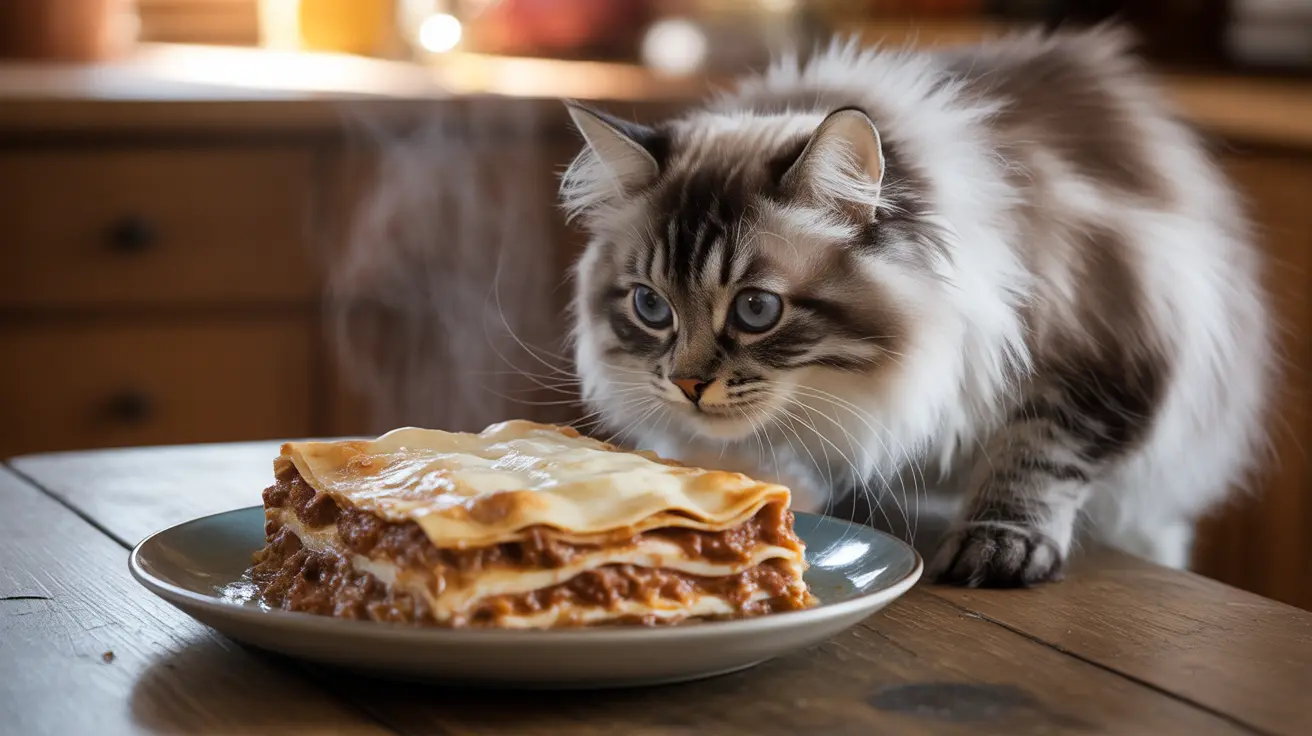The Dangers of Lasagna Ingredients for Cats
Toxic Components
Several common lasagna ingredients can be severely toxic to cats:
- Garlic and onions (including powders) can cause life-threatening Heinz body anemia
- Tomato sauce may contain solanine from unripe tomatoes
- Various herbs and spices that can cause digestive distress
- Salt levels that exceed safe feline consumption
Dairy Problems
Despite popular belief, most adult cats are lactose intolerant. The cheese in lasagna can cause:
- Severe digestive upset
- Diarrhea
- Abdominal pain
- Vomiting
- Dehydration
Why Cats Can't Process Lasagna
Cats are obligate carnivores, meaning their bodies are designed to process meat-based proteins, not carbohydrates. Lasagna's nutritional profile is completely misaligned with feline dietary needs:
- High in carbohydrates from pasta
- Contains inappropriate fats from cheese and meat sauce
- Lacks the specific amino acids cats need
- Contains excessive sodium and seasonings
Signs Your Cat Has Eaten Lasagna
If your cat manages to sneak some lasagna, watch for these symptoms:
- Lethargy and weakness
- Vomiting or diarrhea
- Pale gums (if anemia develops)
- Excessive thirst
- Loss of appetite
- Irregular heart rate
Safe Alternatives to Lasagna for Cats
Instead of lasagna, consider these cat-safe treats:
- Plain, cooked chicken breast
- Small pieces of lean, unseasoned turkey
- Commercially produced cat treats
- Special occasion cat food toppers
Frequently Asked Questions
Is it safe for cats to eat lasagna, even just a small bite?
No, even a small amount of lasagna can be dangerous for cats due to toxic ingredients like garlic and onions, which can cause anemia. The combination of dairy, seasonings, and high carbohydrates can also cause severe digestive issues.
What ingredients in lasagna are toxic to cats, and why?
The most toxic ingredients include garlic and onions (which cause anemia), tomato sauce (potential solanine toxicity), and various herbs and spices that can cause digestive problems. The cheese and pasta, while not toxic, can cause significant digestive issues and contribute to obesity.
What should I do if my cat accidentally eats lasagna with garlic or onions?
Contact your veterinarian immediately. Don't wait for symptoms to appear, as garlic and onion toxicity can take several days to show signs. Your vet may need to provide supportive care and monitor your cat's red blood cell counts.
Can cats eat plain pasta without any sauce or cheese?
While plain pasta isn't toxic, it provides no nutritional value for cats and can contribute to weight gain. Cats are obligate carnivores and don't need carbohydrates in their diet.
Are there any safe, cat-friendly alternatives to lasagna for a special treat?
Yes! You can offer small amounts of plain, cooked meat like chicken or turkey. Some pet stores also sell "cat-safe lasagna" treats that are specially formulated for feline nutrition. Always stick to cat-specific treats or plain, unseasoned meat options.
Conclusion
While Garfield may love lasagna, real cats should never eat this Italian dish. The risks far outweigh any momentary pleasure your cat might get from tasting it. Stick to veterinarian-approved cat food and treats to keep your feline friend healthy and safe. If you want to show your cat some culinary love, choose appropriate alternatives that won't compromise their health.






